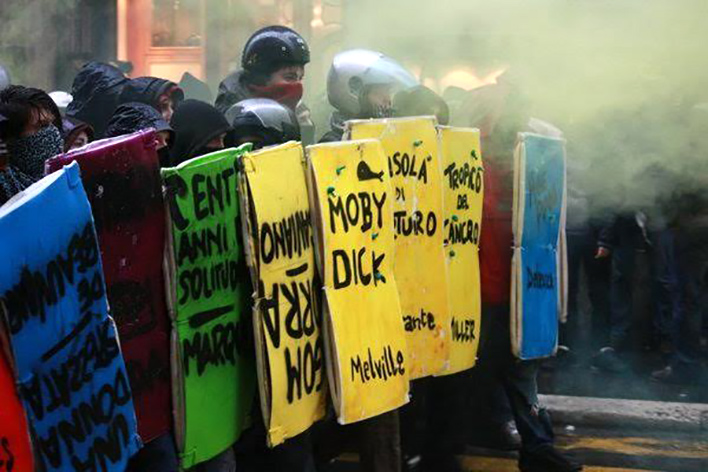Tra letteratura, cronaca e politica: strategie contro l'oblio nelle scritture di frontiera
Abstract
Dopo il fallimento delle politiche contro il narcotraffico in Messico, insieme al conseguente aumento della violenza alla frontiera tra Messico e Stati Uniti, molti autori hanno cominciato a discutere sulle implicazioni etiche e politiche della scrittura che vuole raccontare l’orrore prodotto dalla ferocia della guerra tra i narcos e l’esercito. L'intento di questo saggio mira ad analizzare le strategie di scrittura e di pratica sociale degli autori di frontiera, messicani e chicani. In particolare, si fa riferimento alla poesia documentale e all’uso del poliziesco come denuncia sociale e politica. L’intento di queste nuove scritture non è soltanto quello di mostrare l’orrore della violenza, quanto piuttosto quello di rivelare ciò che resta a quanti sopravvivono a essa. Lo sperimentalismo del poliziesco, per esempio, racconta come la semplice risoluzione del caso non sia abbastanza se il rischio è, dopotutto, l’oblio. Attraverso la teoria sulla rappresentazione del dolore di Susan Sontag e il concetto di opacity of the subject to itself di Judith Butler, cercheremo di analizzare il modo in cui le proposte di questi autori tentano di eludere il pericolo della reificazione del dolore.Downloads
Riferimenti bibliografici
Bibliografia
Anzaldúa, Gloria, Borderlands/La Frontera: The New Mestiza. San Francisco, Aunt Lute, 1987.
Butler, Judith, Giving an Account of Oneself, New York, Fordham University Press, 2005, trad. it. Critica della violenza etica, Milano, Feltri-nelli, 2006.
Cavarero, Adriana, Tu che mi guardi, tu che mi racconti: filosofia della narrazione, Milano, Feltrinelli, 1997.
Close, Glen S., Contemporary Hispanic Crime Fiction. A Transaltlantic Discourse on Urban Violence, New York, Palgrave Macmillan, 2008.
Id., “Anti-novela negra: Cristina Rivera Garza’s La muerte me da and the Critical Contemplation of Violence in Contemporary Mexico”, MLN, 129.2 (2014): 391-411.
Corona, Ignacio – Jörgensen, Beth E. (eds.), The Contemporary Mexican Chronicle: Theoretical Perspectives on the Liminal Genre, Albany, State University of New York Press, 2002.
Egan, Linda, Carlos Monsiváis. Cultura y crónica en el México contemporáneo, México DF., Fondo de Cultura Económica, 2004.
Fadanelli, Guillermo, La otra cara de Rock Hudson, Barcelona, Anagrama, 2004.
Foucault, Michel, Naissance de la biopolitique, Paris, Seuille/Gallimard, 2004, trad. it. Nascita della biopolitica, Milano, feltrinelli, 2005.
Giardinelli, Mempo, El género negro. Orígenes y evolución de la literatura policial y su influencia latinoamericana, Buenos Aires, Capital Intelectual, 1984.
Giroux, Henry A., The Violence of Organized Forgetting: Thinking Beyond America’s Disimagination Machine, San Francisco, City Lights Bookstore, 2014.
Goldberg, Jacqueline, Nosotros los salvados, Caracas, Smashwords Edition, 2013.
Goldsmith, Kenneth, Day, Great Barrington, The Figures, 2003.
Ibarraran-Bigalondo, Amaia, “The River Runs Red! Is it a Miracle, Is it an Ecological Disaster? Ito Romo’s El Puente/The Bridge”, ATLANTIS Journal of the Spanish Association of Anglo-American Studies, 36.2 (2014): 133-45.
Jacobs, Elizabeth, Mexican American Literature: the Politics of Identity, New York, Routledge, 2006.
Kristeva, Julia, Pouvoirs de l'horreur: essai sur l'abjection, Paris, Éditions du Seuil, 1980, trad. it., Poteri dell'orrore: saggio sull'abiezione, Milano, Spirali, 2006.
Le Billon, Philippe, The Political Economy of War: What Relief Agencies Need to Know, London, Network Papers, 2000.
Mbembe, Achille, “Necropolitics”, Public Culture, 15.1 (2003): 11-40.
Ravelo, Ricardo, Narcomex: historia e historias de una guerra, New York, Vintage Español, 2012.
Montemayor, Carlos, Rehacer la historia, México DF, Planeta, 2000.
Noguerol Jiménez, Francisca, “Entre la sangre y el simulacro: últimas tendencias de la narrativa policial mexicana”, Tendencias de la narrativa mexicana actual, Ed. José Carlos González Boixo, Madrid, Iberoamericana-Vervuert, 2009: 169-200.
Padura Fuentes, Leonardo, Modernidad, Postmodernidad y novela policial, La Habana, Editorial Unión, 2000.
Paz, Octavio, Postdata, México DF, Siglo XXI, 1970.
Poniatowska, Elena, La noche de Tlatelolco, México DF, Era, 1971.
Rivera Garza, Cristina, La muerte me da, México DF, Tusquets, 2007.
Id., Dolerse. Textos desde un país herido, Oaxaca de Juárez, Sur+, 2011.
Id., Los muertos indóciles, México DF, Tusquets, 2013.
Romo, Ito, El Puente/The Bridge, Albuquerque, University of New Mexico Press, 2000.
Id., The Border is Burning, Albuquerque, University of New Mexico Press, 2013.
Rulfo, Juan, Pedro Páramo, México DF, Fondo de Cultura Económica, 1955.
Simpson, Amelia, Detective Fiction from Latin America, Toronto, Dickinson University Press, 1990.
Sontag, Susan, Regarding the Pain of Others, New York, Picador, 2003.
Sotelo Baker, Susan, Chicano Detective Fiction: a Critical Study of Five Novelists, Jefferson, McFarland, 2005.
Taibo II, Paco Ignacio, “La «otra» novela policiaca”, Los Cuadernos del Norte, 8.41 (1987): 36-41.
Villoro, Juan, “La frontera de los ilegales”, Anales de Literatura Hispanoamericana, 24 (1995): 67-75.
Walsh, Rodolfo, Operación Masacre, Buenos Aires, De La Flor, 1957.
Sitografia
LFE, Laboratorio Fronterizo de Escritores, http://laboratoriofronterizo.blogspot.it/, ultimo accesso 29/04/2015.
Informazioni sul copyright
Questa licenza permette a terzi di riprodurre, distribuire, comunicare al pubblico, esporre in pubblico, rappresentare, eseguire, recitare e modificare quest'opera, purché vengano citati l'autore e la rivista. Questa è la più ampia tra le licenze Creative Commons, rispetto alle libertà concesse a terzi sulle opere licenziate sotto Attribuzione.









